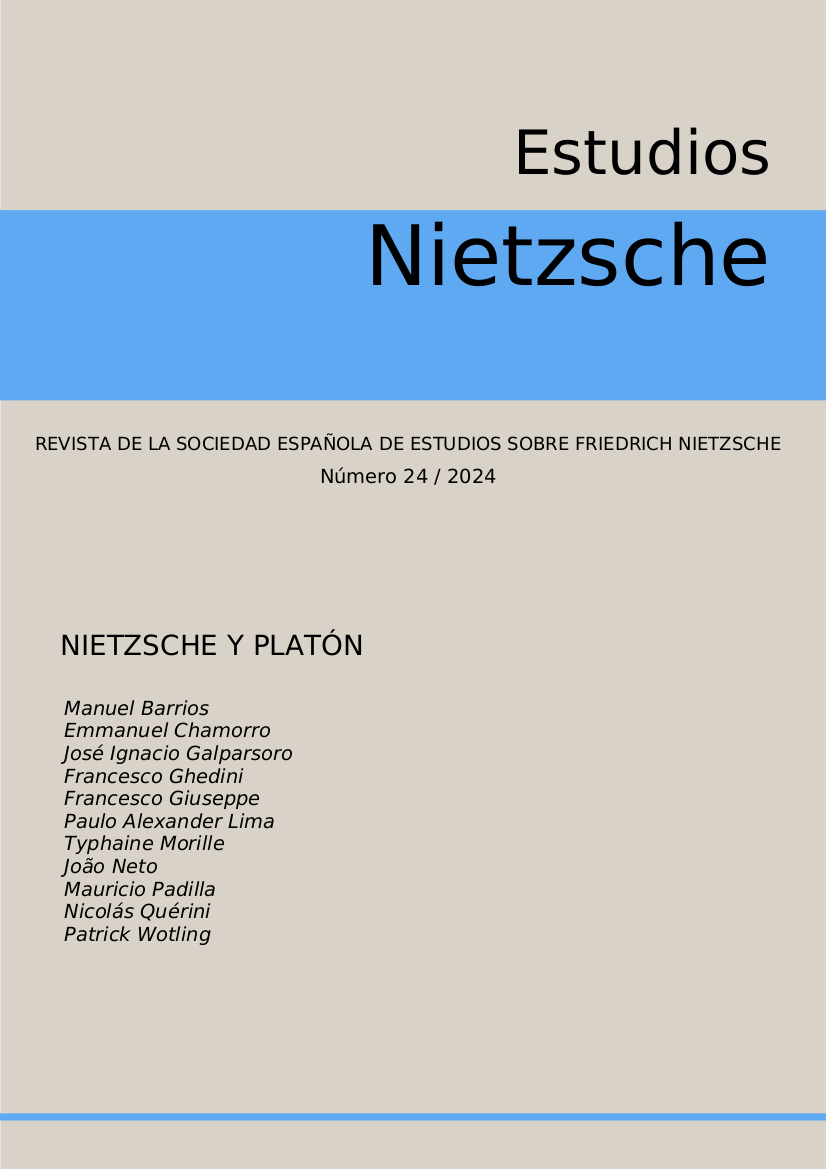“Plato versus Homer”: the antagonism of lies according to Nietzsche
DOI:
https://doi.org/10.24310/en.24.2024.18971Keywords:
Homer, art, lie, philosopherAbstract
Nietzsche's obsession with Plato has little parallel in the history of philosophy other than Plato's obsession with Homer. In both cases, admiration is matched by exasperation and, if we are to believe Nietzsche, even by “aversion” (KSA 11, 25 [103]). From his earliest works in Basel, Nietzsche seems to have sided with Homer, with “the whole Olympus of appearances” (GS, Preface for the Second Edition, § 4) and superficiality “out of profundity”, against Plato, “a man of many back caves and foregrounds” (KSA 11, 34 [66]). “Plato versus Homer: that is the complete, the genuine antagonism”, On the Genealogy of Morals solemnly sums up (GM, III, § 25). It sounds like a declaration of war. On the one hand, the will to truth and belief in morals ; on the other, the will to deception and beautiful, misleading images: two “natural antagonists”, two competing ideals. But how does the anti-dualist thinker of Beyond Good and Evil, who rejects any idea of real opposition, understand this antagonism? Is it really a question of pitting art against science? According to Nietzsche, the school of lies is where these formidable educators clash, their battle of models shaping European culture. “But education for what?” (KSA 12, 5 [50]). It is by learning from Homeric transfiguration and Socratic ruses that Nietzsche develops his understanding of the oppositional logic of the will to power, and raises the question of the future task of the authentic philosopher.
Downloads
Metrics
References
BURCKHARDT, Jacob, Histoire de la civilisation grecque, trad. F. Mugler, éditions de l’Aire, 2002 / Griechische Kulturgeschichte, Berlin, Hofenberg, 2016.
BALAUDÉ, Jean-François, Le savoir-vivre philosophique. Empédocle, Socrate, Platon, Paris, Grasset, 2010.
BLONDEL, Éric, le corps et la culture, Paris, PUF, 1986 ; rééd. L’Harmattan, « La librairie des Humanités », 2006 / Nietzsche: The Body and Culture, Stanford University Press, 1991.
DENAT, Céline et WOTLING, Patrick, Dictionnaire Nietzsche, Paris, Ellipses, 2013.
DIXSAUT, Monique, Platon-Nietzsche. L’autre manière de philosopher, Paris, Fayard, 2015.
MÜLLER-LAUTER, Wolfgang, « Le problème de l’opposition dans la philosophie de Nietzsche », trad. B. Benoit, Revue philosophique de la France et de l’étranger, 4/2006, p. 455-478.
WOTLING, Patrick, La philosophie de l’esprit libre. Introduction à Nietzsche, Paris, Flammarion, 2008.
WOTLING, Patrick, Nietzsche et le problème de la civilisation, Paris, PUF, 1995, rééd. 1999, rééd. coll. Quadrige 2009, 2012 / Nietzsche e o problema da civilização, São Paulo, Discurso Editorial & Editora Barcarolla, coll. « Sendas e veredas », 2013.
Downloads
Published
How to Cite
Issue
Section
License
Copyright (c) 2024 Tiphaine l

This work is licensed under a Creative Commons Attribution-NonCommercial-ShareAlike 4.0 International License.
As of issue 21 (2021) this journal is published only in open access (diamond route).
From that number 21, like the previous numbers published in NIETZSCHE STUDIES, they are subject to the Creative Commons Acknowledgment-NoComercia-ShareIgual 4.0 license, the full text of which can be consulted at <http://creativecommons.org/licenses/by-nc-sa/4.0 >
It is the responsibility of the authors to obtain the necessary permissions of the images that are subject to copyright.
This work is licensed under a Creative Commons Attribution-NonCommercial-ShareAlike 4.0 International License.
Copyright generates two different rights: moral rights and patrimonial rights that EJFB recognizes and respects. Moral rights are those relating to the recognition of the authorship. They are rights of a personal nature that are perpetual, inalienable, unseizable and imprescriptible as consequence of the indivisible union of the author and his/her work.
Patrimonial rights are those that can be derived from the reproduction, distribution, adaptation or communication of the work, among others.







11.png)
